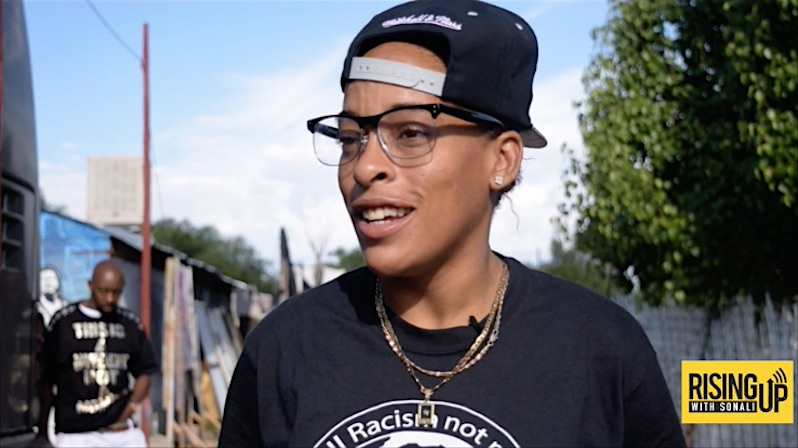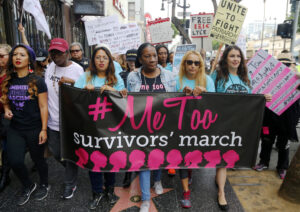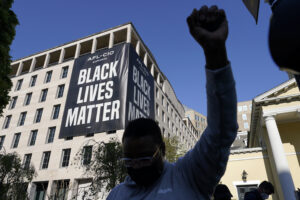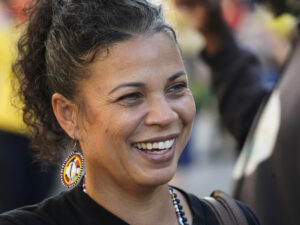Partial Victory for Black Lives Matter Activist Jasmine Richards
The case that the 28-year-old community organizer represents is another reason why the movement it has galvanized is more crucial than ever. Pasadena-area Black Lives Matter activist Jasmine Richards. (Video still from "Rise Up With Sonali")
1
2
Pasadena-area Black Lives Matter activist Jasmine Richards. (Video still from "Rise Up With Sonali")
1
2
It is worth reviewing what actually happened that led to Richards’ arrest and conviction, for it did not happen within an overtly political or activist context:
Richards and several of her friends and colleagues became involved in an altercation between Pasadena police and a black woman who had apparently left a restaurant without paying her bill. Richards, who had been leading a demonstration nearby, attempted to intervene. While she was not the only one to do so, she was the only one of the group whom the police arrested two days later and charged with “attempted felony lynching,” among other things.
It is the “lynching” charge that provoked the greatest public ire after Richards was convicted last week. News outlets all over the world reported that she was the first black person to be tried and convicted of such a horrendously named accusation. That a black woman was convicted of a charge stemming from the United States’ hideous history of mob murders of African-Americans struck a collective nerve. Richards is also the only BLM activist nationwide to have received such a severe sentence since the movement began in 2014.
But why did Richards and her friends intervene in the arrest of a stranger? Black folks and BLM activists have every reason to fear for the safety of black women being arrested by police. It is not just the high-profile case of Sandra Bland in Texas that underscores that fear; in addition to Bland, four other black women died in police custody last July alone. One report tallied 15 cases of black women who died in encounters with police. If today’s police and justice system are seen as the modern-day version of a lynch mob, there is something seriously wrong with our society.
Among the most recent cases is that of Wakiesha Wilson, 36, who authorities say hung herself in her jail cell in Los Angeles. Richards had been working closely with Wilson’s family when convicted. Wilson’s aunt, Sheila Hines, spoke at the rally outside Richards’ sentencing hearing, saying, “She has been a voice for my family when we were unable to speak. … She’s been a great force in our lives.”
Gyamfi has said that Richards will probably serve 36 days of her 90-day sentence—a sentence that could have been as long as four years. As is usually the case, the probation will more than likely be onerous and could blunt Richards’ activism for three long years, even though she will be able to return to the park where she organizes. The 52 anger management courses mandated in the sentence are disgraceful, however. Black women have so much to be outraged by, and yet when women like Richards use their voices, they are subject to the ugly stereotype of the “angry black woman” and are told to submerge their rage and “manage” their anger.
I first met Richards in 2014, when BLM co-founder Patrisse Cullors brought her to an interview on my show, then named “Uprising.” Cullors was among the hundreds of people demanding that the judge “Free Jasmine” this week.
I asked her if she considered Richards’ sentence a victory or a defeat.
“It would be politically immature of me to say that this was not a victory,” she replied. “But it would be naive of me to say that this was a victory.”
And so the struggle for black lives continues, with the hope that Richards’ case has energized rather than dampened the movement.
Watch Sonali Kolhatkar’s special report from the rally outside Jasmine Richards’ sentencing hearing at www.RisingUpWithSonali.com
Your support matters…
SUPPORT TRUTHDIG
Independent journalism is under threat and overshadowed by heavily funded mainstream media.
You can help level the playing field. Become a member.
Your tax-deductible contribution keeps us digging beneath the headlines to give you thought-provoking, investigative reporting and analysis that unearths what's really happening- without compromise.
Give today to support our courageous, independent journalists.






You need to be a supporter to comment.
There are currently no responses to this article.
Be the first to respond.